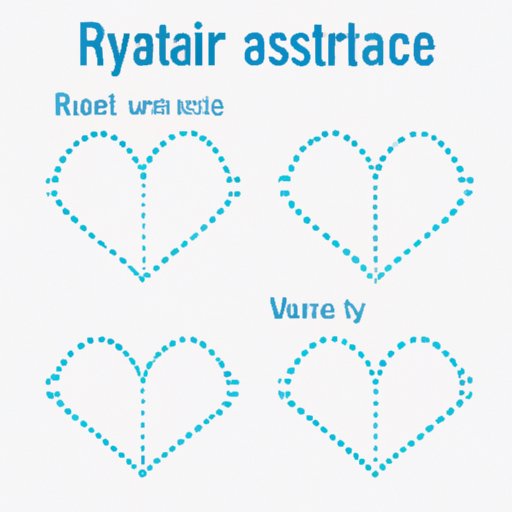Introduction
A high heart rate, also known as tachycardia, is a condition where your heart beats faster than normal. A normal resting heart rate for adults ranges from 60 to 100 beats per minute (bpm). If your heart rate rises above 100 bpm, it can be a sign of an underlying health issue, such as anxiety or stress, and should be discussed with a doctor.
If you’re looking for ways to quickly lower your heart rate, there are several methods that you can try. In this article, we’ll explore 8 proven methods for quickly lowering your heart rate.
Deep Breathing Exercises
Deep breathing exercises are a great way to reduce stress, slow down your heart rate, and improve overall wellbeing. Deep breathing activates the parasympathetic nervous system, which helps your body relax and lowers your heart rate.
Benefits of Deep Breathing Exercises
- Reduces stress and anxiety
- Improves focus and mental clarity
- Lowers blood pressure and heart rate
- Releases endorphins and improves mood
Step-by-Step Instructions for Deep Breathing Exercises
- Find a comfortable position, either seated or lying down.
- Place one hand on your chest and the other on your stomach.
- Take a deep breath in through your nose, counting to five as you inhale.
- Exhale slowly through your mouth, counting to five as you exhale.
- Continue breathing deeply for 5-10 minutes.
Progressive Muscle Relaxation
Progressive muscle relaxation is a technique that involves tensing and relaxing different muscle groups, which helps to reduce tension and stress in the body. This technique has been shown to help reduce anxiety and lower heart rate.
Benefits of Progressive Muscle Relaxation
- Reduces stress and tension
- Improves sleep quality
- Lowers heart rate and blood pressure
- Boosts energy levels
Step-by-Step Instructions for Progressive Muscle Relaxation
- Find a comfortable position, either seated or lying down.
- Tighten each muscle group for 5-10 seconds, then release.
- Start with your feet and work your way up your body.
- Focus on the feeling of relaxation after each muscle group is released.
- Continue for 10-15 minutes.
Yoga and Meditation
Yoga and meditation have long been used as tools for reducing stress and calming the mind. Studies have shown that both yoga and meditation can help to lower heart rate and improve overall wellbeing.
Benefits of Yoga and Meditation
- Reduces stress and anxiety
- Improves focus and concentration
- Lowers heart rate and blood pressure
- Boosts mood and increases energy levels
Step-by-Step Instructions for Yoga and Meditation
- Find a comfortable position, either seated or lying down.
- Close your eyes and take a few deep breaths.
- Focus on your breath and allow your body to relax.
- Practice simple yoga poses, such as mountain pose, downward facing dog, or child’s pose.
- Continue for 10-20 minutes.
Exercise or Physical Activity
Regular exercise or physical activity can help to reduce stress and lower heart rate. Exercise helps to release endorphins, which can reduce stress and improve your mood. Any form of exercise can be beneficial, but low-impact activities such as walking, swimming, or cycling may be best for those looking to quickly lower their heart rate.
Benefits of Exercise or Physical Activity
- Reduces stress and anxiety
- Improves mood and boosts energy levels
- Lowers heart rate and blood pressure
- Improves sleep quality and overall wellbeing
Step-by-Step Instructions for Exercise or Physical Activity
- Choose a form of exercise that you enjoy.
- Start slowly and gradually increase the intensity.
- Focus on your breath and allow your body to relax.
- Pay attention to how your body feels, and stop if you feel any pain or discomfort.
- Continue for 20-30 minutes.
Avoid Stimulants
Certain substances, such as caffeine, nicotine, and alcohol, can act as stimulants and raise your heart rate. Avoiding these substances can help to keep your heart rate at a healthy level.
Examples of Stimulants to Avoid
- Caffeine (coffee, tea, energy drinks)
- Nicotine (cigarettes, vaping, chewing tobacco)
- Alcohol
- Recreational drugs
Tips for Avoiding Stimulants
- Limit or avoid caffeine and nicotine.
- Drink alcohol only in moderation.
- Avoid recreational drugs.
- Make sure to get enough sleep.
- Drink plenty of water throughout the day.
Aromatherapy
Aromatherapy is the practice of using essential oils to promote relaxation and healing. Certain essential oils, such as lavender, chamomile, and ylang-ylang, have been shown to help reduce stress, ease tension, and lower heart rate.
Benefits of Aromatherapy
- Reduces stress and anxiety
- Promotes relaxation and improves sleep quality
- Lowers heart rate and blood pressure
- Boosts mood and energy levels
Step-by-Step Instructions for Aromatherapy
- Choose an essential oil that you like the smell of.
- Add a few drops of the essential oil to a diffuser or oil burner.
- Inhale the aroma deeply and allow yourself to relax.
- You can also add a few drops of essential oil to a warm bath.
- Continue for 10-15 minutes.
Conclusion
There are several methods that can help you quickly lower your heart rate. Deep breathing exercises, progressive muscle relaxation, yoga and meditation, exercise or physical activity, avoiding stimulants, and aromatherapy are all effective techniques that can help you reduce stress and lower your heart rate. Try incorporating some of these methods into your daily routine and see what works best for you.
Final Advice for Lowering Your Heart Rate Quickly
- Practice deep breathing exercises regularly.
- Try progressive muscle relaxation when feeling stressed.
- Incorporate yoga and meditation into your daily routine.
- Get regular exercise or physical activity.
- Avoid stimulants such as caffeine, nicotine, and alcohol.
- Use aromatherapy to reduce stress and promote relaxation.
(Note: Is this article not meeting your expectations? Do you have knowledge or insights to share? Unlock new opportunities and expand your reach by joining our authors team. Click Registration to join us and share your expertise with our readers.)
